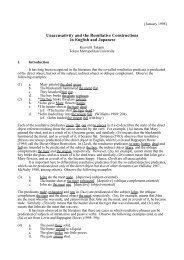Presuppositional Effects of Scrambling Reconsidered*
Presuppositional Effects of Scrambling Reconsidered*
Presuppositional Effects of Scrambling Reconsidered*
You also want an ePaper? Increase the reach of your titles
YUMPU automatically turns print PDFs into web optimized ePapers that Google loves.
c (What’s your neighbor building?)<br />
- My neighbor is building a desk.<br />
(Reinhart 1997:155)<br />
<strong>Scrambling</strong> <strong>of</strong> the object NP in Dutch shifts the main stress to the verb. This is<br />
because the scrambled object is not the most deeply embedded and therefore is<br />
destressed in the sense that it does not bear the main stress. By (20), the structure in<br />
which the object is scrambled is usable if and only if the scrambled object is<br />
presuppositional in the sense that it is D-linked to an accessible discourse entity.<br />
(20) A DP is destressed if and only if it is D-linked to an accessible discourse entity.<br />
(Neeleman and Reinhart 1998:338)<br />
The lack <strong>of</strong> stress on the scrambled object is now analyzed as the source <strong>of</strong> the<br />
presuppositional effect <strong>of</strong> scrambling.<br />
For cases like (21) and (22), in which the stress falls on a position not expected by<br />
the nuclear stress rule, Reinhart proposes the rule in (23).<br />
(21) (Has your neighbor bought a desk already?)<br />
a. # - My neighbor is building a desk.<br />
b. - My neighbor is building a desk.<br />
(22) (Who is building a desk?)<br />
a. # - My neighbor is building a desk.<br />
b. - My neighbor is building a desk.<br />
(Reinhart 1997:157)<br />
(Reinhart 1997:157)<br />
(23) Stress shift<br />
Relocate the main stress on a constituent you want to focus. (Reinhart 1997:157)<br />
Reinhart further argues that stress shift in fact involves two distinct operations. One is<br />
destressing, whereby the object is destressed resulting in the prominent stress on the<br />
verb. The operation is subject to (20) above, and is allowed only when destressing by<br />
scrambling is unavailable (as it is in English). The other operation <strong>of</strong> stress shift is<br />
stress strengthening, whereby an extra stress is assigned to the verb without destressing<br />
<strong>of</strong> the object. 5 It is governed by the following economy condition. 6<br />
5 Stress shift obtained by strengthening <strong>of</strong> the verb retains a secondary stress on the object. The effect<br />
should be distinguished from that obtained by scrambling, where the object is essentially destressed and<br />
hence must be D-linked. This can be seen with “light” indefinites, as illustrated below.<br />
(i) a. Have you eaten anything already?<br />
b. Heb je al iets gegeten<br />
have you already anything eaten<br />
c. *Heb je iets al gegeten?<br />
have you anything already eaten<br />
(Reinhart 1997:163)<br />
6



